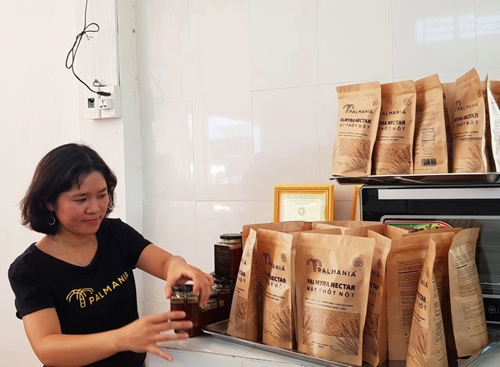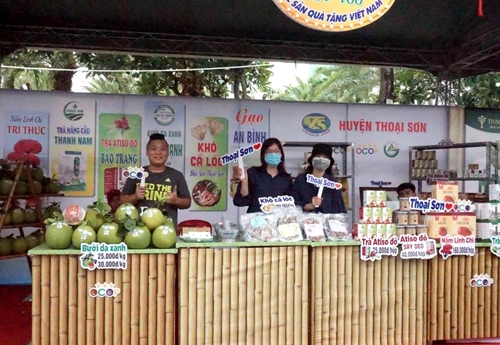Among these products, many are from ethnic minority areas, creating favorable conditions for local people to take part in production chains, improve farm produce values, and develop economy in an effective and sustainable manner.
Helping OCOP products of ethnic minority groups go further
    |
 |
|
Businesswoman Chau Ngoc Diu, Director of Palmania Joint-stock Company, introducing her product |
Over the past time, An Giang province has concentrated on developing products which are strengths of local traditional craft villages. This has made the products closer to customers and visitors, creating specialties of the province and raising added value for each product.
As reported, Tan Chau townlet is home to six OCOP-certified products, including two from the Cham ethnic group in Chau Phong commune.
Hua Hoang Vu, owner of Anas business household, said that he has adjusted the flavor of the beef sausage and dried beef, the two OCOP products of the Cham people and their familiar dishes in Roya Haji Festival, to meet customers’ taste nationwide. He has also paid due attention to ensuring food hygiene and safety.
Another OCOP product is Palmania sugar which is made from natural palmyra nectar by the Khmer ethnic group in Tri Ton mountainous district. The product has been nominated as a five-star national OCOP one. According to businesswoman Chau Ngoc Diu, Director of Palmania Joint-stock Company, such sugar is the Khmer people’s passion, desire, and aspiration. She added that the company’s product has been distributed to 14 cities and provinces nationwide and the company is promoting it in the European market.
Developing OCOP products associated with tourism
    |
 |
|
OCOP products of Thoai Son district, An Giang province |
Each OCOP product is a cultural ambassador of a locality, featuring local people’s tradition and customs. Thus, it is necessary to introduce cultural values crystallized in the products to visitors.
After four years implementing OCOP program in Tinh Bien border townlet, the locality’s products have been sold at Antesco shops, airports, and other shopping places in Ho Chi Minh City, Hanoi, and Can Tho city.
Nguyen Thanh Hung, Vice Chairman of Tinh Bien district’s People’s Committee said that the district targets to build 40 typical tourist products, including 20 OCOP ones getting three stars and higher certificates. So far, it has 15 OCOP products.
Improving quality of OCOP products
The People’s Committee of An Giang province has recently launched a plan to improve the quality of products, promote the locality’s potential and strengths, and raise locals’ income as well as restructure the local agricultural sector associated with craft industry, rural tourism, and preservation of cultural values, landscapes, environment, and digital transformation.
In 2023, the province invests over VND 3,415 billion in perfecting the process of evaluating and classifying OCOP products in the 2021-2025 period. It also specifies support policies to develop these products according to value chain and in the direction of circular economy. The province strives to have an addition of 40-50 OCOP products certified three stars and higher and at least 10 four-star OCOP products by the end of this year.
Vice Chairman of An Giang provincial People’s Committee Tran Anh Thu stressed that the province gives priority to developing special products of strength and traditional values, building some models of “Building the value chain of OCOP products associated with local raw material areas,” and piloting building OCOP products in tourism-service industries.
Source: Baobienphong
Translated by Mai Huong